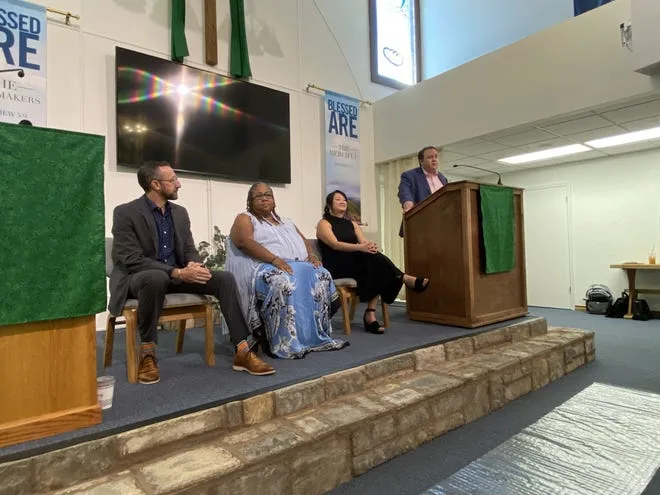
A photo of robed Ku Klux Klan members proudly posing at a 1933 Oklahoma City church dedication was shown Saturday as an example of how Christianity has been linked over the years to ideologies deemed as un-democratic and un-Christian in some circles.
Two Oklahoma scholars discussed these viewpoints at “The Threat of White Christian Nationalism” forum on Friday and Saturday at Edmond Trinity Christian Church (Disciples of Christ).
Samuel Perry, Ph.D., a University of Oklahoma sociologist and co-author of the book “The Flag and the Cross,” talked to a mostly white crowd of 130 people about what is and isn’t white Christian nationalism, which he described as an ideology, political strategy and an emerging identity.
Lisa Barnett, Ph.D., a professor at Phillips Theological Seminary, shared her research on the Ku Klux Klan in Oklahoma during a presentation titled “Using the Flag and the Cross: Strategies of the Ku Klux Klan.”
The forum, which included a panel discussion, was moderated by Edmond Trinity’s co-pastor the Rev. Don Heath. Speakers for the lively panel discussion included Adam Brooks, president of the Jewish Foundation of Greater Oklahoma City; Rev. Sheri Dickerson, founder and executive director of Black Lives Matter-Oklahoma City; and Veronica Laizure, deputy director of the Council on American-Islamic Relations-Oklahoma chapter.
Heath said his congregation read Perry’s book “The Flag and the Cross” as part of the church book club and felt the community-at-large needed to be educated about white Christian nationalism. He said he wanted people to know about the ideology because it amounts to heresy and is harmful.
Perry told the crowd his research did not show that white Christian nationalism is “exploding,” but people needed to know what it is because more people are beginning to openly identify with the ideology. Perry said it has also surfaced in the political arena, which is another reason attendees needed key information.
How the KKK used Christianity, nationalism to grow its ranks
Barnett showed forum attendees how Christianity and Anglo-Protestant supremacy ideology have been intertwined through the years, especially with the rise of the KKK in the 1920s.
Many of the vintage KKK pamphlets, brochures and photos she showed elicited audible gasps from attendees. Some of the images intermingled Christian symbols like the cross with symbols like the American flag. One photograph that seemed to disturb the crowd more than others was one taken at the (now defunct) Lincoln Terrace Christian Church dedication in Oklahoma City which showed a crowd of people in the church sanctuary, while above them in a balcony stood a large group of robed and hooded KKK members.
Barnett said the KKK recruited members by promoting the idea that people who were good American citizens and Christians should want to be part of the group. Recruiters, who were given money for everyone they recruited, sold people on the idea that “the more like Christ, the better Klansman we are.” She said they targeted institutions like public schools because they wanted to remake them in their own image and created voting blocs to get candidates elected who adhered to their way of thinking.
For his part, Perry said some facets of white Christian nationalism include the beliefs that America has a special place in God’s plan, that the federal government should declare America a Christian nation and that violence may be necessary to get the country “back on track.”
Also, Perry said, there is research showing that people who ascribe to the white Christian nationalism ideology are more likely to ascribe to Eschatology, also known as End-Time biblical prophecy, and believe in what he described as fertility regimes such as a concern about “white replacement.”
Perry said former President Donald Trump was the first president in the modern era to talk about faith in war terminology. He also talked about Gov. Kevin Stitt’s controversial statement in 2022 that he was claiming “every square inch” of Oklahoma for Jesus.
“The tricky thing is that some people don’t directly state Anglo-Protestant supremacy (ideology) in terms like the KKK,” Perry said. “Ethnicity is implied because Christianity is a code word for ‘our kind of people.'”
He said it was important for forum attendees to know what isn’t white Christian nationalism. For instance, Perry said white Christian nationalism isn’t another name for white evangelicals. He said there are many evangelicals who are standing against white Christian ideology. He also said white Christian nationalism should not be misconstrued with Christian patriotism.
“Loving your country is good and I believe there is a clear distinction between patriotism and nationalism,” Perry said.
The professor said he also wanted attendees to recognize that there is a positive Christian influence in the U.S. and that Christians have done good things for America. Having said that, he reiterated that when he talks about white Christian nationalism, he is not saying Christians should not get involved in politics.
The good news, Perry said, is the ideology doesn’t seem to be “exploding in the population.”
“But what it does suggest is the people who ascribe to this are the “true believers,” he said.
When asked what people could do to counter the ideology, Perry said one way was to vote for people who don’t adhere to the anti-democratic ideology. He said it was important attendees pay attention not just to presidential and congressional elections but local elections, like school boards.
What can be done to address white Christian nationalism?
The forum speakers and panelists urged the crowd to share truth when they see white Christian nationalism expressed on social media and in everyday conversations.
Laizure said simply attending the forum was a good step toward addressing the ideology. Brooks said letting people know that one is an ally to marginalized and oppressed groups is one way to confront white Christian nationalism. Dickerson said it was important to note that while white people are trying to decide how vigorous they are going to work against anti-Blackness, Islamophobia, trans-phobia and similar prejudices, people who have to confront such bigotry, racism and abuse on a daily basis continue to be harmed.
More: white Christian nationalismEdmond church to host event examining white Christian nationalism
Heath said he was thrilled that so many people were interested in the forum’s topic. The church’s new, expanded parking lot filled to capacity and attendees were directed to an overflow parking area. The church pews also filled quickly and church members set up folding chairs to accommodate the growing crowd. Heath said he was especially pleased that he met many attendees he didn’t know, who came from other parts of the community and state like Moore, Norman, Lawton and South Grand Lake. Some attendees were members of other Christian Church (Disciples of Christ) churches but many others were from other faith traditions including Catholic and United Methodist. The event also drew several people who said they were atheists.
Many forum participants said they decided to attend the event because they were interested in hearing scholars and community leaders discuss what they considered a timely topic.
Dennis Purifoy, who is white, said he felt Perry shared important information.
“I feel like I’m better informed and could speak more knowledgeably about it,” he said. “And, I think one thing we all have to do is to, when we see it, recognize it, and if we can, when we’re in a group or among friends, or wherever, we can point it out and say ‘do you really believe all that?'”
Michayla Harris-Tate, a Black attendee, said she was particularly interested in hearing about the intersection of race and Christianity and when those faith beliefs are turned into “something that it is not designed to be.”
“Also, a lot of the talks I hear about this come from other Black people and it’s different to hear about it from a white perspective,” she said.
Meanwhile, Heath’s tone was somber when he gave his closing remarks. He said the forum was only the beginning of a discussion that needs to continue. He said author Michelle Alexander mentioned in her “The New Jim Crow: Mass Incarceration in the Age of Colorblindness” that white supremacy ideology and racism would find a way to morph or evolve into something else even if the criminal justice system was changed. Heath said he felt Alexander’s assessment was right.
“It’s an organic system that we haven’t found a way to deal with it,” he said. “So that’s our charge — so our children don’t have to experience those things.”
More: Gov. Stitt claims state for JesusStitt draws ire over for claiming ‘every square inch’ of Oklahoma for Jesus


